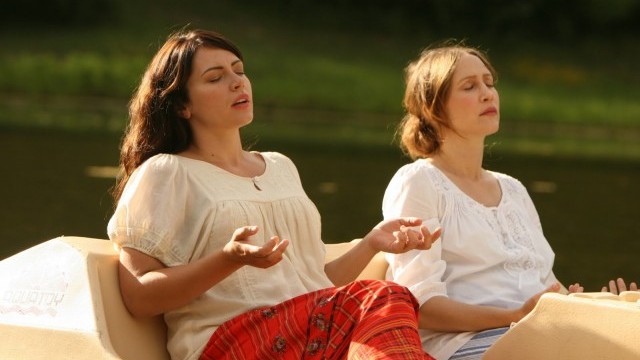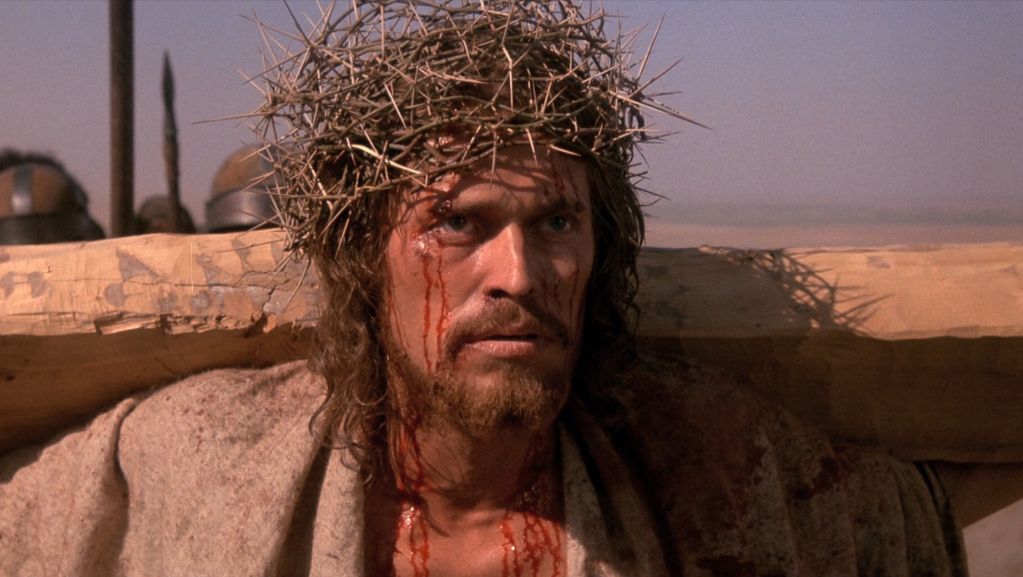Raoul F Gonzo: As a Christian, this topic interests me, but I want to go beyond the simple, “Faith based films are the pits,” conversation. Because obviously. My question is this – why can’t Christians seem to impact the culture at large in any significant way other than “get off my lawn” type yelling or lame attempts at proselytization? I have a pretty concrete idea of why this is the case and how Christianity can have a positive influence (positive to Christians and the culture) on society, but I’d like to hear everybody’s thoughts.
 Anthony Pizzo: I actually think we should lay some of the blame for that at the feet of distributors. They’ve constructed a stereotype of what a Christian audience is and will respond to, and those two extremes seem to be it. I believe there have been some more introspective and calm movies about faith (Vera Farmiga directed one called Higher Ground in 2011 that has an 80% on Rotten Tomatoes), but I don’t think they get any promotion because I could only think of the one example.
Anthony Pizzo: I actually think we should lay some of the blame for that at the feet of distributors. They’ve constructed a stereotype of what a Christian audience is and will respond to, and those two extremes seem to be it. I believe there have been some more introspective and calm movies about faith (Vera Farmiga directed one called Higher Ground in 2011 that has an 80% on Rotten Tomatoes), but I don’t think they get any promotion because I could only think of the one example.
 Guy Vollen: Unfortunately, aside from the shrillness or sectarian nature of any particular Christian film, there is a pernicious attitude I have encountered among many (fellow) Christians that execution is less important than the spirit behind the message. The flip side is audiences who are willing to judge a film by what it’s trying to say rather than how well it says it.
Guy Vollen: Unfortunately, aside from the shrillness or sectarian nature of any particular Christian film, there is a pernicious attitude I have encountered among many (fellow) Christians that execution is less important than the spirit behind the message. The flip side is audiences who are willing to judge a film by what it’s trying to say rather than how well it says it.
That’s not to say that all Christians are uncritical (and certainly not to say that movies like God’s Not Dead speak for all Christians, in case that needs to be said). I’ve read several articles by Christians in recent months addressing Raoul’s exact question: why are so many Christian movies so bad, and why do Christian audiences (seemingly) have such low standards? I’ve also heard from Christians about the theology underlying the Left Behind series, which is definitely not shared by all Christians.
Is it simply that Christian audiences want to see themselves and their issues reflected on the screen? In that sense, are they any different from comic book fans who will line up for any superhero movie, if only to show their support for the team?
 Julius Kassendorf: I think everybody is sympathetic for movies that portray whatever belief system they feel is being neglected by mainstream culture. Gays have historically given gay cinema so many passes for being so damned average just because they’re gay. Starting in the mid-to-late 90s, the gay cinema ghetto was really a ghetto for terrible films being promoted by my friends as good films just because they were gay. I have sat through so many awful cliched terrible crappy gay films just because they were gay. Hell, even this year at SIFF, I sat through a few coming-of-age films that people genuinely loved but I thought were just like everything else. In the past, people gave passes because so few of the films reflecting their life existed. But, there’s only so many Billy’s Big Hollywood Screen Kiss movies you can sit through before you’re tempted to go straight.
Julius Kassendorf: I think everybody is sympathetic for movies that portray whatever belief system they feel is being neglected by mainstream culture. Gays have historically given gay cinema so many passes for being so damned average just because they’re gay. Starting in the mid-to-late 90s, the gay cinema ghetto was really a ghetto for terrible films being promoted by my friends as good films just because they were gay. I have sat through so many awful cliched terrible crappy gay films just because they were gay. Hell, even this year at SIFF, I sat through a few coming-of-age films that people genuinely loved but I thought were just like everything else. In the past, people gave passes because so few of the films reflecting their life existed. But, there’s only so many Billy’s Big Hollywood Screen Kiss movies you can sit through before you’re tempted to go straight.
The other aspect is one that came up in a discussion at The Dissolve regarding Tyler Perry. Christian films have a different way of telling stories in part because it is part of the way that Christian stories have always operated. From the days of Chick Tracts to the wave of Hallmark Christian movies to the current wave of mainstream Christian movies, they’ve always had a storytelling that operates differently from the way that secular storytelling doesn’t. The origins may actually have to do with the elements of preaching and also Church Theater that actually effect the expectations of style and polish. As a lapsed Catholic, I found that The Last Temptation of Christ was one of the most impressive movies about faith that almost pulled me back into the fold as a teenager, but it operates on a far more secular level than Temptation: Confessions of a Marriage Counselor. So, maybe I’m not the best one to be commenting on this.
Raoul F. Gonzo: I like all of these thoughts. I think everybody is on to something. But here’s my take – Christianity, particularly the Protestant/non-Catholic strains, tends to either retreat from culture altogether or awkwardly absorb the culture, resulting in the weird syntheses that we see like God’s Not Dead and Left Behind and bands like Lifehouse. The latter happens, in my view, because Christians want to be entertained but don’t want to feel guilty for watching something “dirty” and they don’t want to consider opinions or philosophies different from their own. There is a (terrible) Christian film that sums up this philosophy perfectly called Timechanger. I’ll spare you the plot details, but the “moral of the story” is that Christian morality divorced from Christianity is bad. Christians, for the most part, want to enjoy the entertainment, but there is the lingering belief that if it isn’t explicitly Christian, it’s implicitly sinful.
I’m of the mind that the best way to absorb and understand an alternate belief or philosophy is to experience it through art. I’m also of the mind that the worst way to convert is through art. When I tell other Christians that I want to be a director they naturally say, “Oh, you’ll make Christian films?” No. There is no “Christian film,” as I see it. I’m a Christian and a filmmaker, so my films will naturally reflect who I am, but I would never use a film to just convince people to believe the same thing I do. And this is what I think the problem is – Christianity appears buffoonish at best and hateful at worst to modern society because Christians are so unwilling to engage and be involved in the culture. (There are other reasons too, but this is part of it.) So as I see it, Christians need to make “real films” – blockbusters, romantic comedies, legal thrillers, horror films, road movies, Woo-style action flicks, monster movies, etc. etc. etc. And I don’t mean all of those things with “Christian-” affixed to the front. Just make good, solid, well-written, creatively directed movies. Help the world understand the core truths of Christianity – mercy, grace, forgiveness, love. That’s what I hope to do someday.


